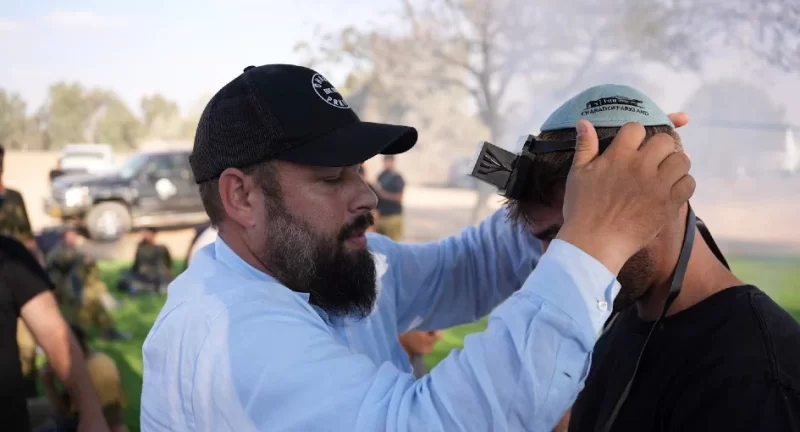
Chabad Miami Delegation Brings Supplies and Positive Spirits to Israel
by Noa Amouyal – chabad.org
On Yom Kippur, David, a 68-year-old resident of Tel Aviv spent the holiest day of the Jewish year protesting against a mechitza placed at an outdoor prayer service in Dizengoff Square. He says he hadn’t touched tefillin since his bar mitzvah 55 years ago and thought he never would again. But the terrorist massacre on Simchat Torah changed his perspective.
David is a member of a group of reservists from various units in the Israel Defense Forces who have been organizing supplies of protective equipment to soldiers and aid packages to residents of southern communities who have been evacuated. David had been dispatched to the Re’eim army base, near Gaza, which had been captured by Hamas and then retaken by the IDF.
When he saw a group of Chabad Chassidim on the base, he eagerly approached them and told them he was “yearning to feel the sacred leather straps on his skin.” When he finally donned them, he wept.
“I’m not a rabbi but I know how to put tefillin on someone and give them hugs,” Menachem Mendy Krinsky, a businessman from Miami told Chabad.org. “He wanted to feel like we were all one nation. When he embraced me, the hug wouldn’t end.”
Krinsky was part of a Chabad delegation from South Florida that brought emissaries and volunteers to Israel as part of a solidarity mission in the wake of Hamas’s brutal terrorist attack against Israel’s southern communities which left more than 1,400 Israelis dead.
The Florida group was one of many Chabad missions from around the world that have or will visit Israel, including a delegation from Thailand and a group of 26 Chabad rabbis from around the United States who are arriving in Israel today.
The Florida mission had three goals, explained Rabbi Chaim Lipskar, director of the Shul of Downtown Chabad in Miami: to provide basic gear and necessities to IDF soldiers, boost morale, and give chizuk (“strength”) to victims of terror who are wounded in hospitals. Other major figures responsible for making the delegation successful included Rabbi Eli Lipskar, who oversaw logistics, and Samuel Backer who helped organize the trip.
“We came with a message of optimism, strength and wanting to reflect on the message that the Rebbe—Rabbi Menachem M. Schneerson, of righteous memory—gave before the Six-Day War in 1967, where he said Israel will ultimately be successful,” he said.
“This was our way of telling the people of Israel that the Jewish world has your back,” said Rabbi Shuey Biston, co-director of Chabad’s Parkland Headquarters for North Broward and South Palm Beach.
To that end, the delegation brought with them 52 bags of donations worth $200,000, including 87 bullet-proof vests, 100 first-aid kits, 100 tablets, 3,000 protein bars, 50 sleeping bags, 100 pairs of tzitzit and more.
The six Chabad emissaries and volunteers flew from Miami to Tel Aviv along with reservists and families anxious to get back home.
“People were very nervous, but once we started singing ‘Am Yisrael Chai,’ everyone’s morale was raised,” Lipskar added.

Visits to Wounded Soldiers and Damaged School in Ashkelon
On their three-day trip, the delegation visited a school in Ashkelon which was damaged by a rocket, met with wounded IDF soldiers at Barzilai Medical Center and visited army bases where members of the Miami Jewish community were stationed.
While the IDF managed to secure Israel’s south after the savage attack, the carnage left in the wake of the brutality remained. Blood-soaked doorways, eerily empty schools and playgrounds have become military sites manned by the IDF.
“We saw hundreds of soldiers sleeping in a school,” Lipskar said.
They also hosted BBQs for reservists and prayed with them.
“During the fog of war, we as Jews abroad had our rallies back home, but we needed to do something bigger and deeper,” Biston said. “I told my community on Shabbat that this is our gut-check moment. Our generation will be defined by how we respond to our people in Israel. Sending goods is important, but what they really need is community to show that Am Yisrael will not cower in fear. The Torah commands us, Al Tirah (‘Do not fear’), and that’s what we’re doing—standing up to fear.”

The delegation also spent time getting to know the various communities impacted. On one visit to Maslul, one of the few border communities spared in the attack, they met with Etti, a woman who was cooking food for the reservists in the now shuttered community center.
Etti mentioned to Biston that she has a son in the Orlando area—a good three to four hour drive from Miami. Upon his return to Miami, Biston, not thinking he’d actually meet her son, texted him anyway to check how he was doing.
It turned out that the son was actually in town for a job interview. Biston offered to host him for Shabbat, and over that holy day of rest Bitson found the community of Maslul—a town in Israel with only 200 families—represented at his Shabbat table.

“For me to bring this mission back home was so powerful. This was about Am Yisrael standing together, no matter where we are in the world. To come home and continue to experience hosting her son from her small town so far away, this is what our people are all about. Am Israel is not just words. It means something,” Biston said.
“We went there to give—give equipment, give support, raise the morale—but I believe the ones that took the most are ourselves! To see the achdus of all different types of Jews is something I will remember forever,” Rabbi Eli Lipskar stated.
Biston agreed, adding: “It was an incredible moment. I cried when we left. I felt we accomplished so much. We went to inspire them, and in the end, we were the ones that walked away inspired.”












